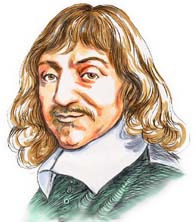Rene Descartes Biography

René Descartes, the most original philosopher to appear since Aristotle, is often considered to be the father of modern philosophy. He was born on March 31, 1596 in La Haye, France (now called Descartes) to a well-to-do family.
While his father, a judge, encouraged him to continue in law after graduating, Descartes preferred instead to "pursue his thoughts", travel and dedicate his life to intellectual studies.
René was a strong contributor and significant presence in the growing intellectual and scientific activity of his time. As well as being a mathematician, he established himself in physics as the discoverer of the law of refraction in optics and in philosophy for his most famous work Meditations on First Philosophy.
In Meditations on First Philosophy, he raised problems of such radical skepticism about our knowledge of the world, that he set the agenda for epistemology (study of origins of knowledge) for the next 300 years. The only thing we can be certain of, he suggested, is our own existence.
His famous declaration, 'Cogito ergo sum' - 'I think therefore I am', is his proof of his own existence as a thinking being and the starting point for the search of certainty.
Descartes objective in the Meditations was to structure human knowledge on a solid foundation. In reviewing his own beliefs, he realized that many were conflicting, others inconsistent, and some more justified than others. He wanted to assign order to his jumble of beliefs so that as in the certainty of mathematics, the justification of one proposition could follow from another. Where would he start?
Rather than attempt the next to impossible task of examining and categorizing each belief, he decided to examine them against a method of doubt. He would do this by questioning the source of his beliefs and by asking if it was infallible. If it was not, then it was not reliable for providing the foundations of knowledge.
He also noted that many of his beliefs derived from his senses or perception, which of course, could be deceptive and misleading. For instance, a person could be hallucinating or his senses could be eluded when looking at a stick that appears bent in a stream. Based on this observation, he declared that any information obtained from the senses to be uncertain and fallible and therefore untrustworthy.
The one proposition Descartes did trust, however, was his ability to think and reason. He felt that since he is able to think, it must be the case that he exists. Likewise, he must exist in order to be able to think. The certainty that he was a thinking being gave Descartes the basis for establishing his foundation of knowledge.
From this 'Cogito' Descartes developed an argument for the existence of two distinct substances, one material and one non-material and thus created the philosophical concept of Cartesian dualism.
In Cartesian dualism the mind and body are two distinct and different substances. Minds are things which think and bodies are extended things or space-occupiers. Descartes felt that he could not doubt that he existed as a thinking substance, yet he could still doubt that he had a body. It was this point that convinced him that mind could exist independently of matter.
For Descartes the foundations of knowledge were not confined to philosophy. Mathematics for him was the model of all knowledge because its truths were undeniable. He felt that anyone seeking truth should look for the certainty equal to arithmetical or geometrical demonstration. Likewise, he relied on the human capacity of reason to perceive something 'clearly and distinctly' without reference to or dependence upon sensory experience.
Ultimately Descartes set out to show that not only is genuine knowledge possible, contrary to what the skeptics put forth, but that mathematically-based scientific knowledge of the material world is possible. He also demonstrated that we as humans have the intellectual ability to reach an understanding of the world as well as the power to make reasoned judgments about it.
| Next > |
|---|

